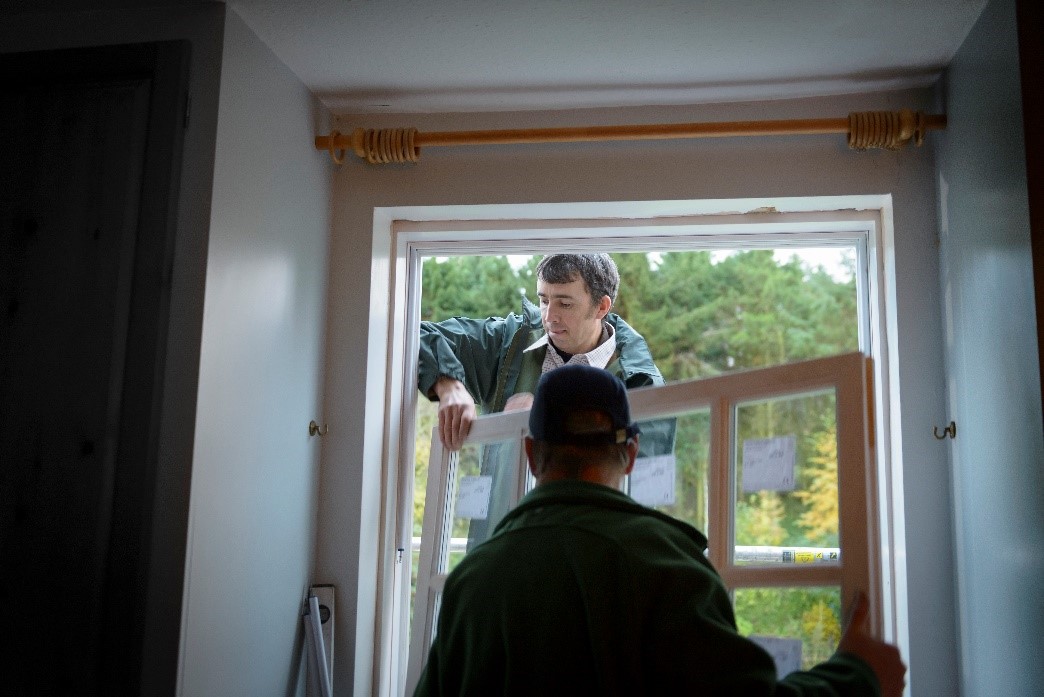Remodeling your home is an exciting time, often the result of years of planning, saving, and imagining how things could be. And when done right, it’s a project that adds value, comfort, and beauty for the long haul. However, there’s one aspect of the remodeling process that’s often overlooked, and it can impact homeowners years down the road: the home remodeling warranty.
Lifetime Warranty | Limited Warranty | Quality Control | Industry Reviews | Local
In this edition of StraightTALK, we’re digging into the areas homeowners care about most and contractors don’t always want to talk about: warranties, quality control, and industry reviews. We’ll explain what you can expect, what to watch out for, and what we consider best practices in the home remodeling industry.
What does a “Lifetime Warranty” really mean in home remodeling?
A Lifetime Warranty in home remodeling can mean very different things depending on who offers it and what they actually cover. Sometimes it’s only materials. Other times it’s only labor. Occasionally, it covers both, but limitations are often buried in the fine print. Homeowners often assume “lifetime” means everything is covered forever, but that’s rarely the case.
How to read a home remodeling warranty document
Warranty documents come in all shapes and sizes. Some are one-page summaries; others are multi-page documents with detailed terms. Here’s what to look for:
- Exclusions: What isn’t covered? For example, storm damage, misuse, or alterations.
- Time limits: How long is “lifetime” really? It may be defined as the “useful life.”, maybe 20 years. Others might cap the full coverage at 5-10 years before switching to limited or prorated terms.
- Transferability: Can the home remodeling warranty continue if you sell your home? Are there any steps you need to take?
- Claim Process: Who do you contact, and what documentation is required? Do you need photos, receipts, or proof of regular maintenance?
What does it mean if a warranty is prorated?
A prorated warranty means that your coverage diminishes over time. For example, a 15-year siding warranty might cover 100% of replacement costs in the first 5 years, but only 50% by year 10. These warranties still offer value, but it’s not the same as full coverage for the product’s entire life.
Always ask your contractor or manufacturer: Is this a full warranty or a prorated one? And if it’s prorated, how does that scale over time?
Who is the warranty from: manufacturer or contractor?
Knowing who issued the home remodeling warranty is essential because it determines who you’ll contact if something goes wrong. A manufacturer might warranty the product itself but not the installation. A contractor might warranty the workmanship, but if they subcontract the work or close up shop, that warranty could be void.
What is Workmanship?
Workmanship refers to the quality and skill with which your remodeling project is executed. It’s about how the materials are installed. You can buy the best cabinets in the world, but if they’re installed crookedly or poorly anchored to the wall, they’ll never perform as they’re supposed to.
This is why many manufacturers separate product warranties from workmanship. For example, if you’re installing new kitchen cabinets, the manufacturer might warranty the cabinet box and finish for 10 years. But if the cabinets aren’t level or the doors don’t close properly because of a bad install, that’s on the contractor. Their workmanship warranty should cover that.
Does the home remodeling warranty cover labor, materials, or both?
This is a critical distinction. If your warranty only covers materials, you will be responsible for the labor costs associated with fixing it.
When is something NOT covered under my home remodeling warranty?
Warranties are not a blanket insurance policy. Here are some common scenarios where coverage might be denied:
- Accidental damage: If someone in your home breaks a window or door, that won’t be covered.
- Neglect: Failing to perform maintenance tasks, such as cleaning gutters or resealing caulk, can void coverage.
- Acts of nature: Storms, floods, or hail may fall under your homeowner’s insurance, not the warranty.
- Modifications: If you alter the product (e.g., painting over a surface or drilling holes), the warranty could be void.
Understanding the scope and limitations of your warranty upfront saves frustration down the road.
At Hometown Restyling, we’re clear about what our warranty covers, because we actually expect to be here when you need us. We offer lifetime workmanship warranties backed by a team of experienced employees who take pride in every job.
StraightTALK Remodeling Tip:
Always ask who holds your warranty and what happens if the company is no longer in business. That means asking the contractor: Will you still be here in five or ten years? Do you have a physical address, a staffed office, and a consistent presence in the community? A good contractor won’t hesitate to show you how their warranty is backed up.
Why do so many remodeling companies offer “Lifetime Warranties” that are limited?
Many remodeling companies offer lifetime warranties. However, many in the industry use it as a blanket term to mean many things, which is why you need to read the fine print.
The term “lifetime warranty” isn’t standardized in the remodeling industry. That means companies can use it in marketing materials without defining what it actually means. It could refer to the lifetime of the product, the company, or a set number of years.
Many remodeling contractors use “lifetime warranty” as a sales hook. They know it sounds good, and they know most homeowners won’t read the fine print until it’s too late. If there are issues with contractors honoring a home remodeling warranty, it usually goes something like this:
- A contractor uses vague or misleading warranty language.
- They use the cheapest materials to boost their profits.
- They subcontract the labor with little oversight.
- Something goes wrong months later.
- You call the number on the contract, and you’re not covered.
Subcontractors and Your Warranty
Determine whether subcontractors are covered under a lifetime warranty. If the work is subbed out and something fails, who is responsible? A contractor might claim it’s out of their hands.
At Hometown Restyling, we handle things differently. We use our in-house installers for nearly all our projects because they’re trained, experienced, and part of our team. For specialty portions of a job (like plumbing or electrical), we use subcontractors, but only those we trust enough to work in our own homes. They are all local professionals with reputations we stand behind.
Most importantly, we always consider a project a Hometown Restyling job, regardless of whether subcontractors are involved. If there’s ever an issue tied to subcontracted or in-house work, we make it right.
What happens if you need to make a warranty claim?
If you need to make a home remodeling warranty claim, refer to the warranty document you’ve received from your contractor or call them directly. Even a great warranty isn’t worth much if the claims process is a nightmare. A lot of homeowners find this out the hard way. Filing a claim can turn into a game of voicemail tag, confusing paperwork, and finger-pointing between the manufacturer and the contractor.
At Hometown Restyling, we take full ownership of our work. If something goes wrong, we step in, figure it out, and fix it. Our customers have enough to worry about, the last thing they need is to be stuck in warranty limbo. That being said, we do use a mix of manufacturing warranties and our own lifetime workmanship warranty for our installations.
In the contracting space, warranties should be straightforward, and a documented claims process should be in place. A reputable company will have a clear, easy-to-follow process and stand by it. If you need to make a claim find out:
- Who handles the claim? (Contractor or manufacturer?)
- What documentation is needed? (Photos, receipts, original contract?)
- Will someone come out to inspect the issue?
At Hometown Restyling, our home remodeling warranty is a promise backed by a team, a showroom, and a real presence in the community. If something goes wrong, you’ll know exactly where to find us.

StraightTALK Remodeling Tip:
Ask if your contractor uses subcontractors and whether the same home remodeling warranty covers their work. Subcontractors may not be held to the same standard, and their work might not be included in your coverage. Always ask: If a subcontractor performs part of my job and an issue arises later, who is responsible? Will you handle the fix or leave me dealing with someone I’ve never met?
What quality control steps should my contractor take during a remodeling project?
Quality control in remodeling means your contractor has a process for keeping your project on track, on time, and up to standard. It’s about professionalism, respect for your home, and attention to detail every step of the way.
Process Controls
Good contractors follow a process. That means regular job site checks, clear communication, and documented workflows to ensure no steps are missed. They manage the project from start to finish with accountability built in.
Ask your contractor what checks and balances they have in place to ensure quality control. Do they assign a project manager? Is there a schedule you can follow? Are there regular quality checks throughout the job? A professional process will include pre-construction meetings, material inspections, mid-job walkthroughs, and a final punch list. These checkpoints catch issues before they become costly mistakes.
Some good indicators that your remodel will go smoothly include:
- The contractor handles all necessary permitting and inspections
- They carry insurance and can provide proof upon request
- They use a clear written agreement with scope, pricing, and responsibilities outlined
- They assign a dedicated point of contact for communication
These are green flags that point to a contractor who takes quality control seriously.
Material Quality Matters
The quality of materials used can drastically affect the durability and appearance of your finished project. Yes, quality materials may drive up cost, but they directly contribute to a better result that lasts longer and performs better.
For example, installing premium vinyl windows will withstand moisture, UV rays, and wear and tear. Not to mention it will help you save on energy costs. The same goes for siding and decking. Better materials reduce maintenance and extend the life of your remodel.
At Hometown Restyling, we use professional, insured crews and maintain internal quality standards that go way beyond “good enough.” We pay our installers more because we expect more from them. And we only work with high-quality manufacturers that we trust.
As our founder, Wayne, likes to say: “Quality only hurts once: when you write the check.”
StraightTALK Remodeling Tip:
Check the quality of materials yourself before making a final decision. Visit the showroom or request a sample of the product, so you know exactly what you’re getting.
Why does the remodeling industry have so many bad reviews?
The remodeling industry has a reputation for bad reviews because there is a wide range of quality standards across the industry. Some contractors use lower-quality materials to keep prices low for owners, but then fail to hold themselves accountable when the products don’t stand the test of time. Those contractors and remodelers who cut corners give the industry a bad name, but it only reinforces the fact that homeowners across eastern Iowa need high-quality remodeling.
Low Barriers to Entry
In many areas, anyone with tools and a truck can call themselves a contractor. It can be too easy for underqualified workers to start a business and take on jobs they can’t finish well. And unfortunately, many homeowners don’t know what questions to ask until it’s too late.
This results in inconsistent standards, unqualified labor, and subpar project outcomes. It also tarnishes the entire industry’s reputation. Even reputable companies must work harder to regain the trust of their customers.
What to look for: Licensed, insured contractors with professional training and a track record.
No Accountability
Many contractors fail to follow up after the job is completed. If something goes wrong, they disappear. Accountability means being available after you’ve made your final project payment to address any issues, answer questions, and ensure the customer is delighted. Look for contractors who have been in business locally for years.
What to look for: A physical showroom, an active presence in the community, and a clear warranty policy that’s honored.
Unrealistic Quotes
Low bids lead to corner-cutting. If a price seems too good to be true, it probably is. Cheap quotes usually mean using inferior materials, rushing labor, and limited flexibility for correcting mistakes or addressing change orders.
What to look for: Detailed proposals that explain costs and don’t dodge the details.
StraightTALK Remodeling Tip:
Consider how a company addresses issues, not just its star rating. A perfect score is tough, but read the reviews and look for consistency, honesty, and responsiveness when problems arise.
What are the benefits of hiring a local home remodeling company?
Hiring a local remodeling company means choosing a partner who has a vested interest in the project. Their name, reputation, and relationships are all at stake. That means more accountability, better follow-through, and a higher likelihood that they’ll do the right thing.
“The most expensive project is the one you do twice.”
That’s less likely to happen with a local, reputable company. Why? Because they know you can track them down. You’ll see them at the ball game, the grocery store, or school pick-up. There’s a built-in level of trust and transparency when you live and work in the same community.
At Hometown Restyling, we’ve been part of this community for almost 40 years. We have a full showroom. A staffed office. Owners on site. If you ever have an issue, you can contact us by phone, visit us in person, or walk in and speak directly with a decision-maker.
Hiring a local company also increases the chances that your home remodeling warranty will actually be honored. Local companies with a strong reputation don’t want to risk losing that trust. Peace of mind may cost a bit more, but it’s worth it in the long run.
StraightTALK Remodeling Tip:
Prioritize companies you can visit in person. You should be able to walk into their office, see their showroom, meet the team, and know they’re not going anywhere. Physical presence equals real accountability. If you can’t find them after the job, how can you expect them to honor a warranty or answer a service call?
StraightTALK Wrap-Up
The home remodeling industry has some negative reviews, warranties that are too difficult to understand, and subpar workmanship. But you don’t have to become one of those stories. Do your diligence, read the home remodeling warranty, and visit the showroom.
With the right partner, remodeling will be smooth, professional, and the exciting process it should be. At Hometown Restyling, we’ve built our business on doing things right and standing behind every job we do.
If you want straight answers, honest pricing, and the kind of quality you only have to pay for once, we’re here for you. Check out this article on how to kick-start the home remodeling process with a consultation.



